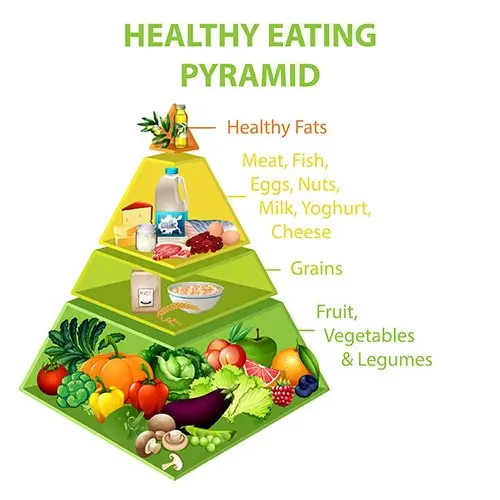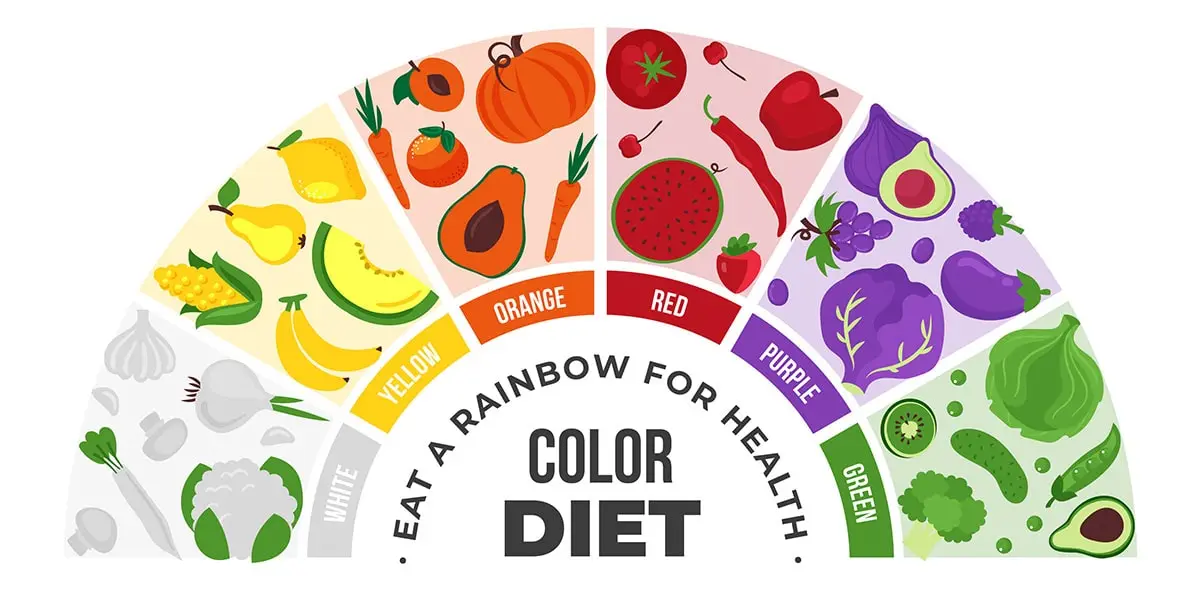Healthy Food diet is essential for overall well-being and can help prevent various chronic diseases. Here’s a general healthy food diet chart that you can use as a guideline. Remember that individual nutritional needs may vary based on factors like age, gender, activity level, and any specific health conditions.
Consulting with a registered dietitian or healthcare professional can provide personalized guidance.
Breakfast:
– Whole-grain cereal or oats with low-fat milk or plant-based milk (e.g., almond milk)
– Fresh fruit (e.g., berries, banana, apple)
– A source of protein (e.g., Greek yogurt, scrambled eggs, nut butter)
Mid-Morning Snack:
– Handful of nuts (e.g., almonds, walnuts)
– Fresh vegetables (e.g., carrot sticks, cucumber slices)
Lunch:
– Lean protein (e.g., grilled chicken, tofu, legumes)
– Whole grains (e.g., brown rice, quinoa, whole wheat bread)
– A variety of colorful vegetables (e.g., leafy greens, bell peppers, tomatoes)
– Healthy fats (e.g., olive oil, avocado)
Afternoon Snack:
– Greek yogurt with berries
– Whole-grain crackers with hummus
– Fresh fruit
Dinner:
– Fish (e.g., salmon, trout) or plant-based protein (e.g., lentils, beans)
– Steamed or roasted vegetables
– Whole grains or starchy vegetables (e.g., sweet potatoes)
– Side salad with a variety of veggies
Evening Snack:
– Low-fat cottage cheese with sliced fruit
– Air-popped popcorn (lightly salted)
Hydration:
– Drink plenty of water throughout the day. Herbal teas and infused water are also great options.
– Limit sugary drinks, including soda and excessive fruit juices.
General Tips:
– Focus on whole, minimally processed foods.
– Include a variety of colorful fruits and vegetables for a wide range of nutrients.
– Choose lean protein sources, such as poultry, fish, legumes, and tofu.
– Opt for whole grains, such as brown rice, quinoa, whole wheat, and oats.
– Use healthy fats like olive oil, nuts, seeds, and avocados.
– Practice portion control to avoid overeating.
– Limit added sugars and refined carbohydrates.
– Reduce sodium intake by using herbs and spices for flavor.
– Plan and prepare meals ahead of time to make healthier choices easier.
Remember that balance and moderation are key to maintaining a healthy diet. It’s important to enjoy your meals and make sustainable choices that fit your lifestyle and preferences. If you have specific dietary needs or health goals, consider consulting a registered dietitian or healthcare professional for personalized guidance.

What are the Best Diets to Maintain Health and Physique?
There is no one-size-fits-all “best” diet that works for everyone, as individual nutritional needs can vary based on factors like age, gender, activity level, health status, and personal preferences. However, there are several well-researched and balanced dietary patterns that can help promote overall health, support a healthy physique, and reduce the risk of chronic diseases. It’s important to find a diet that you can sustain long-term and that aligns with your specific goals.
Here are a few popular and effective dietary approaches:
- Mediterranean Diet: This diet is inspired by the traditional dietary patterns of Mediterranean countries. It emphasizes whole foods, including fruits, vegetables, whole grains, lean proteins (such as fish and poultry), nuts, seeds, and healthy fats (such as olive oil). It limits processed foods, red meat, and sweets. The Mediterranean diet has been associated with reduced risk of heart disease, diabetes, and certain cancers.
- DASH Diet (Dietary Approaches to Stop Hypertension): Originally designed to lower blood pressure, the DASH diet focuses on fruits, vegetables, whole grains, lean proteins, and low-fat dairy. It’s also low in sodium and saturated fats. This diet is beneficial for heart health and can contribute to weight management.
- Plant-Based Diet: Plant-based diets emphasize whole plant foods such as fruits, vegetables, legumes, nuts, seeds, and whole grains. Some people choose a fully plant-based (vegan) diet, while others incorporate more plant-based meals into their diet. A well-balanced plant-based diet can provide essential nutrients and has been associated with lower risk of chronic diseases.
- Flexitarian Diet: This approach combines the principles of a plant-based diet with occasional inclusion of lean meats, poultry, fish, and dairy products. It’s a flexible and adaptable approach that can support overall health and weight management.
- Low-Carb or Ketogenic Diet: These diets restrict carbohydrates and emphasize healthy fats and protein sources. While they may be effective for short-term weight loss, they might not be suitable for everyone and should be followed under medical supervision. Long-term sustainability and potential health risks should be considered.
- Paleolithic (Paleo) Diet: The Paleo diet focuses on whole, unprocessed foods similar to what our ancestors might have eaten, including lean meats, fish, fruits, vegetables, nuts, and seeds. It avoids grains, legumes, dairy, and processed foods. While the diet has gained popularity, there is debate among experts about its long-term health benefits.
- Intermittent Fasting: Intermittent fasting involves cycling between periods of eating and fasting. It doesn’t prescribe specific foods but rather focuses on when you eat. There are various methods, such as the 16/8 method (16 hours of fasting and an 8-hour eating window). Intermittent fasting may aid weight loss and metabolic health, but it’s not suitable for everyone.
Remember that a healthy diet should be balanced, provide essential nutrients, and be enjoyable to follow. It’s important to prioritize whole foods, stay hydrated, practice portion control, and listen to your body’s hunger and fullness cues. Consulting a registered dietitian or healthcare professional can help you tailor a dietary plan that aligns with your goals and health needs. Additionally, incorporating regular physical activity and maintaining a balanced lifestyle are essential components of maintaining overall health and physique.
High Protein Foods Recommended For You
World’s most Nutritious and Healthy foods
Read this Article Also:- Healthy Food for Kids Party | Budget Friendly Ideas | Easy and Fun
If you don’t like this article/post please share your feedback.





